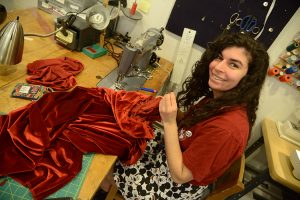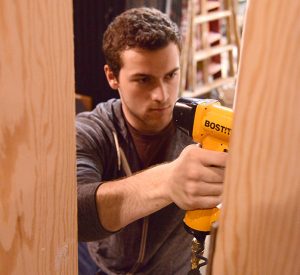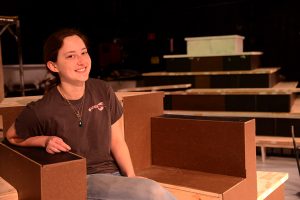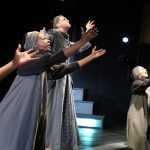“This is a heartbreaking loss, especially for [Goldsteins’] family and loved ones. We have reached out to [Noah’s’] family, and of course will do everything we can to support them in their hour of grief,” said Joseph M. McShane, SJ, president of Fordham.
“It is a terrible blow to lose someone so young and full of promise, and we cannot imagine the pain of Noah’s family and loved ones. I ask that you join me in keeping them in your thoughts and prayers.”
Goldstein, a native of San Jose, California, worked at Ars Nova, a nonprofit theater in New York, as a production intern. Goldstein also worked at the Texas-based Vortex Repertory Theatre and Music & Entertainment Television.
Over the weekend, the Fordham’s theatre program put up a tribute on its Facebook page to the recent graduate, referring to Goldstein using a gender-neutral pronoun, “they.” Friends and faculty noted it was Goldstein’s preferred pronoun.
“They were our best and our brightest. They are gone too soon. Show the other side what great art looks like. Love, The Fordham Theatre Program.”
Goldstein’s focus was on set design, technical direction, production design, and sound design. Goldstein worked on several Fordham theatre productions, among them Oh My Darling, The Man Who Built His House to Heaven, and The Mojo and the Sayso.
After graduating last month, Goldstein landed a job in New York City as a set designer for Lifetime Supply, a show that opens this week at the IRT Theater on Christopher Street.
Tim Zay, Fordham theatre’s technical director, said it was a joy to see Goldstein mature and grow during four years at Fordham. He noted that last April, Goldstein helped the theatre program use, for the first time, computerized moving panels in the mainstage season’s final play, White People.
“[Goldstein] was so full of life, and always finding the humorous part of life. [Noah] was very intelligent, well read, and articulate. I could make obscure references, and [Noah] would pick up on them very easily,” he said. “[Goldstein] was one of these students who came in knowing a good deal, but unlike some who think they know everything and you can’t teach them, [Noah] was open to learning a lot more.”
Kai Brothers, the theatre program’s production manager described Goldstein as a “consummate collaborator, open to exploration, endlessly inquisitive, rigorous in process and able to draw upon boundless reserves of creativity.” He called Goldstein’s stage design work on the play The Man Who Built His House to Heaven “elegantly simple, but really essential.”
“Noah was there during the rehearsal process, the writing process, all the way through,” he said. “Noah was integral to the way that the story took shape on stage.”
Daniel Alexander Jones, head of the theatre program’s playwriting curriculum, called Goldstein one of the program’s best students–“a gifted young artist and magical soul.”
“I will miss our wide-ranging and inspired conversations most of all,” he said.
A Memorial Service for Noah will be held Bellarmine College Preparatory in San Jose, CA in the Leontyne Chapel on Saturday, June 25 at 2 p.m., with a brief reception to follow in Liccardo Hall.
In lieu of flowers, the family asks that those who want to make a memorial gift in Noah’s name can make a donation to Bellarmine Prep, 960 West Hedding Street, San Jose, CA 95126-1215. All donations made in Noah’s name will support Bellarmine’s Theatre Tech Department.
Letters of Condolence may be sent to the Goldstein Family c/o
Fordham University
113 W. 60th Street
New York, NY 10023
Attn: Campus Ministry, LL 217
Plans are underway for a local service. For more information, contact Vincent DeCola at [email protected].
Staff from Counseling and Psychological Services, Campus Ministry, and the Dean of Students Office will be standing by this week to help all who are grappling with Goldstein’s loss.
The Counseling Center can be reached directly at:
Lincoln Center: (212) 636-6225
Rose Hill: (718) 817-3725
Campus Ministry can be reached at:
Lincoln Center: (212) 636-6267
Rose Hill: (718) 817-4500

Kai Brothers waxes philosophical when discussing theater. The production manager for the Theatre program talks about the “thingness” of a play and paraphrases French philosopher Georges Bataille, saying that art is essentially wasteful.
“But there has to be waste in order for things to blossom and I think theater is perfect example of that,” said Brothers, gesturing to the large set for Agamemnon, which consumed 30 sheets of plywood and hundreds of feet of lumber.
The production just wrapped up this month in the Pope Auditorium and concluded a series, A Season of Imagining Post War , that asked the question ‘What if there were no war?”
Brothers’ day-to-day duties involve coordinating artists and designers for almost every physical aspect of a production, from hair and makeup, to costumes, sets, lighting and sound.
Full-time faculty and guest professionals usually direct and design the productions. For Agamemnon, the internationally acclaimed Tea Alagić will direct. But the project was unique in that several students have also taken on leadership roles. Seniors Jessie Bonaventure, Alex deNevers, and Lawrence Schober, designed the sets, lighting, and sound, respectively.
“Typically our student designers work as assistants to professionals, but we have a really strong senior class that were able to take on the challenge and meet it,” said Brothers.
He added that the 16 to 20 design students must compete over the course of the four years for only a couple of design slots that open up each season, creating rather real world competition.

The Agamemnon production was very “build heavy.” Costumes designed by faculty member Becky Bodurtha, were labor-intensive and sculptural. Bonaventure’s sets were series of steps that appear to riff on Mesopotamian ziggurats, deNevers’ lights were incorporated into the structures, and Schober’s sound filled the cocoon-like intimacy of the space.
The production spotlighted Brothers’ more subtle but equally important role, that of mentor and teacher. Yet, the theatre program encourages students to interact with the their professors as professionals.
“It’s a little funky when you’re talking to them,” set designer Bonaventure said of her professors. “Am I talking to a fellow designer, or my production manager, or my mentor? The lines get a little blurred, but in a good way.”
In Brothers, students find a frank professional who has spent more than 12 years as a production manager on and off Broadway in nearly 250 productions.
“There are many different sides to Kai Brothers,” said junior Celina Lam, Agamemnon’s production stage manager. “There are different times where I’m speaking to him at different levels: Sometimes I’m going to him as a learning stage manager in school and ask him how I should run a production meeting. Other times I’m talking to him as a colleague.”
While Brothers teaches only one class, a lab seminar on producing one’s own work, most of his “class time” plays out through building a show. He said that the protocols of the theatre program’s main stage at Pope Auditorium mirror the profession.

“My concerns are less with product and more with process,” he said. “If we can get a designer to talk about what it means to go through a set of drawings, model making, and editing process with scene shop, that’s more important to me than the actual play.”
“We expose our students to the challenges of using their resources effectively—whatever that may be, budgetary, people, time—in order get the artists’ vision up onto the stage,” he said.
He said he loves that he gets to work with so many artists that inhabit a single vision, which, by its very nature, is ephemeral. But at the end of the day, he said, it’s simply story telling.
“You spend all this time, building out a production, you perform it a certain number of times and Whoosh! Poof! It’s gone. Now it’s out there in the cultural zeitgeist and part of the of the culture, that in itself is the thingness of it.”






]]>